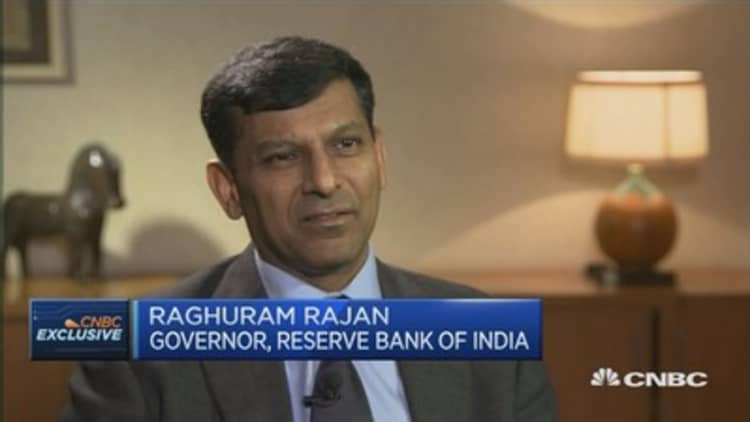Since he swept to power 18 months ago, Indian Prime Minister Narendra Modi has proved to be a charismatic international statesman, impressing leaders from Shinzo Abe to Barack Obama as well as expatriate Indians with his ambition to modernize India.
But his next foreign visit — to the UK this week to meet David Cameron and the Queen and to address a crowd of 60,000 British Indians at Wembley Stadium — will for the first time be overshadowed by deepening troubles at home.
These problems, including a surge of sometimes violent Hindu chauvinism and a slowdown of economic reform, have little to do with Mr Modi's UK hosts.
On the contrary, Mr Cameron and his cabinet are eager to court the leader of the world's largest democracy. They hope to announce an enhanced strategic relationship with India and some $15 billion of trade and investment deals. "There's a feeling that he's still the best thing to happen in India for a long time," says one UK official. "He's someone we can talk to."

Mr Modi will voice a few complaints in London — about Punjabi separatist extremists among British Sikhs, and the visa difficulties of Indians studying in the UK — but his advisers assume any protests by his Muslim critics will be drowned by the applause of the thousands of fellow Gujaratis who will greet him at Wembley on Friday.
It is the chorus of criticism about Mr Modi's performance back in India that is now his main concern. The crushing defeat of his Hindu nationalist Bharatiya Janata party (BJP) in Bihar — the north Indian state of 110m people for which state election results were announced on Sunday — could prove to be a turning point for the man who won the biggest Indian general election victory in a generation only last year.
The Bihar defeat will make it harder for Mr Modi to push his economic reform programmes through parliament, because the weight of the parties in the state assemblies dictates the future shape of the Rajya Sabha, or upper house of parliament. And it is in the Rajya Sabha that Mr Modi's opponents have killed or stalled business-friendly legislation — including a now-abandoned land reform and a nationwide goods and services tax (GST) to ease trade within India.
Even if GST is finally passed in the coming winter session of parliament, that will not be the end of Mr Modi's economic woes.
Senior executives at Indian and foreign companies complain of ineffective ministers and a sense of drift in economic policy after an initial burst of energy last year.
More from the Financial Times:
India's ruling BJP suffers big defeat in Bihar poll
India toll collectors refuse to levy green tax
India's tycoons still like to gamble big
The government, they say, has failed to overcome bureaucratic delays to many investment projects or to reverse a confidence-sapping, retroactive tax law targeting multinationals such as Vodafone.
Worse, Mr Modi's image as a moderniser focused on national development issues such as sanitation and job skills rather than on narrow Hindu interests has been badly tarnished by BJP ministers and rightwing groups such as Shiv Sena, the BJP's ally in Maharashtra, and the Rashtriya Swayamsevak Sangh (Organisation of National Volunteers), the religious parent of the BJP itself.
Among liberals and intellectuals and even moderates in the ranks of the BJP, there has been a marked deterioration of Mr Modi's reputation in recent weeks. That followed the lynching by Hindus of a Muslim man accused of eating beef at his home in Uttar Pradesh (cows are sacred to many Hindus), an official crackdown on civil society groups such as the Ford Foundation and Greenpeace, demonstrations against a visiting Pakistani musician and a writer, and a BJP election campaign in Bihar that veered at times into anti-Muslim rhetoric.
To business audiences, Mr Modi insists he remains focused on the economy. "GDP growth is up and inflation is down. Foreign investment is up and the current account deficit is down. Revenues are up and interest rates are down. The fiscal deficit is down and the rupee is stable," he said in a speech in New Delhi on Friday. "Obviously this did not happen by accident."
Yet everyone from Shah Rukh Khan, the Bollywood film star, to Raghuram Rajan, the central bank governor, has explicitly or implicitly condemned the recent growth of intolerance in India.
Read MoreOne of India PM Modi's biggest achievements, in a chart
Such people are heard in New York and London as well as Mumbai, which could make Mr Modi's hitherto triumphant foreign trips less comfortable in the future.
But it was Arun Shourie, an outspoken former BJP minister and one-time confidant of Mr Modi, who made the cruellest jibe when he suggested that the current government was like the incompetent Congress administration that preceded it, only with added Hindu fervour. "Congress plus a cow," he said. "Policies are the same."


